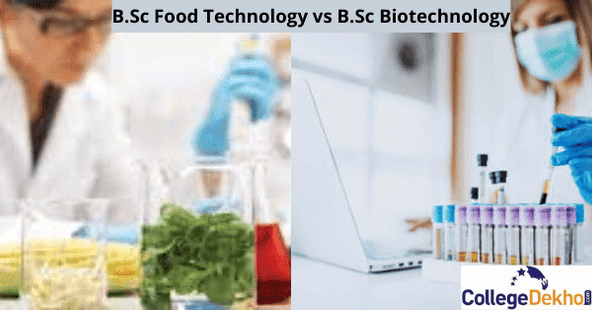With the development of science and technology, the two upcoming UG programmes are BSc Food Technology and BSc Biotechnology. Here is a comparison between BSc Food Technology and BSc Biotechnology listed below.
- Comparison Between BSc Food Technology vs BSc Biotechnology
- Why Study BSc Food Technology?
- Why Study BSc Biotechnology?
- List of Top Colleges for BSc Food Technology and BSc …
- Higher Education Scope after BSc Food Technology
- Higher Education Scope after BSc Biotechnology
- List of Jobs after BSc Food Technology vs BSc Biotechnology
- Government Job vs Private Job after BSc Food Technology vs …
- Scope of BSc Food Technology vs BSc Biotechnology

BSc Food Technology and BSc Biotechnology are the two emerging courses with the advancement in science and technology. Both are advanced courses that focus on the use of technology to improve the efficiency of different sectors and industries. The fields of BSc Food Technology and BSc Biotechnology are distinct from one another. A multidisciplinary study, BSc Biotechnology concentrates on a variety of topics, including Industrial Biotechnology, Medical Biotechnology, Food Biotechnology, Plant Biotechnology, etc. B.C. Biotechnology is used in a number of industries, including the pharmaceutical, agricultural, and food industries. The basic concepts of BSc Food Technology , on the other hand, concentrate around using technology to improve food processing, manufacturing, packaging, and distribution. It can be thought of as a subfield of biotechnology. BSc Food Technology has applications in the food industry, agriculture, nutrition, and health, among other fields.
In this article, we have covered a detailed analysis of BSc Food Technology and BSc Biotechnology.
Comparison Between BSc Food Technology vs BSc Biotechnology
The detailed comparison is listed below. These two degrees BSc Food Technology vs BSc Biotechnology can be distinguished by the following characteristics:
Name of the Degree | BSc Food Technology | BSc Biotechnology |
|---|---|---|
Duration | 03 Years | 03 Years |
Eligibility |
|
|
List of Entrance Exams |
|
|
Admission Process | Both Entrance Based and Merit-Based process | Both Entrance Based and Merit-Based process |
Average Fee | INR 20,000/- to INR 60,000/- | INR 3,000/- to INR 1,00,00/- |
Top Job Roles after Graduating | Food Safety Officer, Food Technologist, Incubation Manager, Food Analyst | Zoologist, Biophysicists or Biochemists, Microbiologists etc |
Top Recruiting Organisations | Cadbury India Ltd, Parle Products Pvt Ltd, Dabur India Ltd, Amul etc | A S Medical Coding Technologies, Visionary RCM Infotech (India) Pvt Ltd, Nestem Technologies etc |
Career Growth | There are several opportunities for a Food Technology degree holder as the degree is a bridge between the Agriculture and Manufacture industry | Career growth for Biotechnology graduates are exponential and better opportunities with each higher degree |
Highest Salary | Around INR 30 LPA | Around INR 10 LPA |
Average Salary | Between 3 LPA to 6 LPA | Between 3 LPA to 5.10 LPA |
Top Colleges |
|
|
List of Government Jobs |
|
|
Why Study BSc Food Technology?
Following are the main pointers to opt BSc Food Technology course after class 12th:
BSc in Food Technology is a good course for students with an interest in understanding the concepts of food science and technology. The course covers detailed concepts of food technology and subjects associated with it
After the completion of BSc Food Technology course, candidates can go for higher education in desired disciplines like M.Sc food technology, MBA Food and Agribusiness Management etc
BSc Food Technology candidates can opt from a list of job roles like food technologists, food inspector, food handler, researcher etc
Also Read : BSc Food Technology vs BTech Food Technology
Why Study BSc Biotechnology?
Following are the main pointers to opt BSc Biotechnology course after class 12th:
BSc Biotechnology is a good career option for a student who has an interest in both biology and technology and wants to explore modern and improvised technologies and contribute to society
BSc Biotechnology programmes include strong academic sessions through practical sessions and provide a gateway for students to explore new possibilities and contribute to the field of biotechnology
After the completion of the BSc Biotechnology course, students can go for higher studies in a relevant discipline and make a bright future in research and development
Candidates with biotechnology are highly in demand in various sectors. The top industries include the pharmaceutical industry, the food industry and the agriculture sector
List of Top Colleges for BSc Food Technology and BSc Biotechnology
Higher Education Scope after BSc Food Technology
Candidates who want to gain advanced knowledge and skills in a discipline associated with BSc Food Technology can opt for higher education. There are various advantages of pursuing higher education after a BSc Food Technology like better payscale, the scope of research, increased job opportunity and career options etc. The best part is that after the BSc Food Technology course candidates have the option to choose a discipline of their choice and excel in the same field.
Following are the popular courses to choose after BSc Food Technology course:
MSc Food Technology
MSc Food Science
MSc Nutrition and Dietetics
MSc in Food Processing
MSc in Food Biotechnology
Higher Education Scope after BSc Biotechnology
After the completion of BSc Biotechnology course, candidates can go for higher studies which will help them excel in their career. Some of the courses that a student can choose after BSc Biotechnology are as follows:
MSc Biotechnology
MSc Microbiology
MSc Biochemistry
MSc Genetics
MSc Forensic Science
MBA Biotechnology
Also Read: BSc in Agriculture vs BSc in Food Technology
List of Jobs after BSc Food Technology vs BSc Biotechnology
Following is the list of job roles and responsibilities available for BSc Food Technology and BSc Biotechnology candidates:
List of Jobs after BSc Food Technology | List of Jobs after BSc Biotechnology |
|---|---|
A food technologist is a professional who is responsible to ensure the safety, quality and hygiene of food products, manufactured, distributed and supplied to consumers. Many of them work in the manufacturing industries of food and drink products. They work closely with experts to determine the alternative course of food items. He/ She also ensure safe and hygienic packaging and delivery of food products
An organic chemist analyses organic compounds and conducts quality control tests. They conduct a test to explore the quality of the product and equipment. They are also involved in the synthesis of an organic compounds. A candidate with a degree in food technology can work as an organic chemist and test food products for their quality and standard
A Food Inspector is a person who tests the quality and standard of raw materials used in the manufacturing of food products. They also inspect the utensils and devices used in the plant site to ensure that it is used in a hygienic manner and it is pollutant-free. It is an important job role for quality assurance of food products
A food handler looks after all the phases of food distribution until it reaches the final consumer. He is involved in packaging storage, transportation, distribution, supply and sale of the product. Food handlers play a vital role in ensuring that the food item and products do not tamper in the middle of the distribution |
The pharmaceutical companies are the largest employers for Biotechnologists. A biotechnologist is hired to develop new and new techniques and contribute to the health sector. There are many medical and research centres in India and abroad that hire candidates at an entry-level for diagnosis and research
Biotechnologists play an important role in the production of enzymes that are required in the production of many food products and drinks. They also contribute to the production of food flavouring agents, flavours and food-enhancing products
A biotechnologist contributes to the production of genetically modified organisms and crops. They help to increase the production of food, provide enhanced technology for harvesting and also find solutions to increase the nutritional value of crops and foods and improvise their storage methodologies |
Also Read:
BSc Food Technology vs B.Tech Food Technology - Check out the difference | Career Options after completing study in Food Technology - Click here to find more |
|---|
Government Job vs Private Job after BSc Food Technology vs BSc Biotechnology
BSc Food Technology and BSc Biotechnology candidates can work both in government and private sectors. Let’s have a look at the job opportunities for BSc Food Technology vs BSc Biotechnology candidates in both Government Job and Private sectors:
Government Job vs Private Job after BSc Food Technology | Government Job vs Private Job after BSc Biotechnology |
|---|---|
BSc Food Technology candidates can find jobs in various government organisations, research centres and laboratories. They are recruited as trainees in the Food Corporation of India and associated companies. After a certain period of training, they are promoted at a higher level and get a better pay scale. These graduates also find a job in laboratories set up by the government to test the quality of food products.
There are many private organizations that recruit BSc Food Technology graduates as a trainee at an entry level. Some of the top recruiters are Nestle, Amul, Britannia, Mother Dairy etc. BSc Food Technology graduates can also find a job in bakeries, and catering services and also get self-employed Candidates can expect a starting monthly salary ranging between INR 15,000 to INR 20,000 per month as a trainee in the government or private sector. The pay scale increases after the completion of training and with the year of experience |
Advancement in the usage of technology in government organisations has increased the demand for biotechnology professionals in various sectors like the pharmaceutical, agriculture and food industry. Biotechnology graduates can apply as a trainee in government organisations and research centres
The scope of BSc Biotechnology candidates in the private sector is demanding in the field of biotechnology. They can work in the R&D department of private laboratories, organisations and pharmaceutical firms. They can also apply in food industries to improvise the production of food products The starting pay scale of BSc Biotechnology candidates ranges between INR 20, 000 to 25,000 per month which increases with years of experience |
Scope of BSc Food Technology vs BSc Biotechnology
Graduates can find lucrative employment in a variety of fields, including catering establishments, hospitals, restaurants, and food processing companies. If you excel in this field, you will be eligible for a variety of benefits and will be able to command a high salary. Some of the highest-paying jobs in Bsc Food Technology are Nutritional expert, Scientist in product/process development, Food technologist and quality manager, Officer of Regulatory Affairs, Technician in a scientific laboratory, Production supervisor Purchasing supervisor, Scientist conducting research (life sciences), Toxicologist, Brewer with technical knowledge. Where on the other hand, Students who complete the BSc Biotechnology course have a wide range of career options. The future prospects for BSc Biotechnology students are as Epidemiologist, Biochemist, Lab technicians, Research Scientist, and Lecturer/Professor in Biotechnology.
Related Articles
For more interesting and informative educational topics, stay tuned to CollegeDekho!
Are you feeling lost and unsure about what career path to take after completing 12th standard?
Say goodbye to confusion and hello to a bright future!

Was this article helpful?





















Similar Articles
PSU Opportunities After Qualifying CSIR NET Exam
PSU Recruitment Process for CSIR NET-qualified Candidates
CSIR NET 2025 Application Form Correction: Check Dates, Process, Details to Edit
CSIR NET 2025 December Session: Steps to Retrieve Application Number & Password
CSIR NET E-Certificate: How to Download, Validity, Documents Required, Instructions
How to Prepare for CSIR NET in 3 months